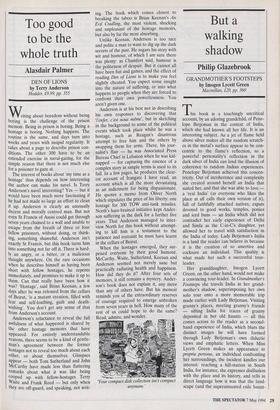Too good to be the whole truth
Alasdair Palmer
DEN OF LIONS by Terry Anderson Hodder, 19.99, pp. 355 Writing about boredom without being boring is the challenge of the prison memoir. Being in prison is boring. Being a hostage is boring. Nothing happens. The routine is the same, and days turn into weeks and years with insipid regularity. It takes about a page to describe prison con- ditions. The other 300 have to be an extended exercise in naval-gazing, for the simple reason that there is not much else for a prisoner to gaze at.
The interest of books about `my time as a hostage' thus depends on how interesting the author can make his navel. Is Terry Anderson's navel interesting? Yes — but it would have been much more fascinating if he had not made so large an effort to clean it up. Anderson is clearly an unusually decent and morally centred man. But not even St Francis of Assisi could get through seven years chained to a wall and unable to escape from the breath of three or four fellow prisoners, without doing, or think- ing, something shameful. Anderson isn't exactly St Francis, but this book turns him into something not far off it. There is hard- ly an angry, or a bitter, or a malicious thought anywhere. On the rare occasions when he describes himself as having been short with fellow hostages, he repents Immediately, and promises to make it up to them. Can that really have been how it was? 'Hostage', said Brian Keenan, a few days after he was released from the cellars of Beirut, `is a mutant creation, filled with fear and self-loathing, guilt and death- wishing'. You don't get any sense of that from Anderson's account.
Anderson's reluctance to reveal the full awfulness of what happened is shared by the other hostage memoirs that have appeared. For entirely understandable reasons, there seems to be a kind of gentle- man's agreement between the former hostages not to reveal too much about each other, or about themselves. Glimpses appear — both Tom Sutherland and John McCarthy have made less than flattering remarks about what it was like being cooped up with fellow-hostages Terry Waite and Frank Reed — but only when they are off-guard, and speaking, not writ- ing. The book which comes closest to breaking the taboo is Brian Keenan's An Evil Cradling, the most violent, shocking and unpleasant of the hostage memoirs, but also by far the most absorbing.
Unlike Keenan, Anderson is too nice and polite a man to want to dig up the dark secrets of the past. He sugars his story with wit and humour, of which I am sure there was plenty: as Chamfort said, humour is the politeness of despair. But it cannot all have been fun and games, and the effect of reading Den of Lions is to make you feel slightly cheated. You expect some insight into the nature of suffering, or into what happens to people when they are forced to confront their own powerlessness. You aren't given one. Anderson is at his best not in describing his own responses to discovering that Tenfer, c'est nous meme', but in sketching in the background to some of the political events which took place whilst he was a hostage, such as Reagan's disastrous attempt to free him and the others by swapping them for arms. There, his jour- nalist's flair — he was Associated Press Bureau Chief in Lebanon when he was kid- napped — for capturing the essence of a complex story in simple terms is used to its full. In a few pages, he produces the clear- est account of Irangate I have read, an account which is all the more devastating as an indictment for being dispassionate. He quotes a memo from Oliver North which stipulates the price of his liberty: one hostage for 300 TOW anti-tank missiles. North's hare-brained initiative kept Ander- son suffering in the dark for a further five years. That Anderson managed to inter- view North for this book without attempt- ing to kill him is a testament to the patience and restraint he must have learnt in the cellars of Beirut.
When the hostages emerged, they sur- prised everyone by their good humour. McCarthy, Waite, Sutherland, Keenan and Anderson seemed not merely sane but practically radiating health and happiness. How did they do it? After four sets of memoirs, it still remains a mystery. Ander- son's book does not explain it, any more than any of others have. But his memoir reminds you of the extraordinary reserves of courage required to emerge unbroken from seven years in hell. How many of the rest of us could hope to do the same? Read, admire, and wonder.
`Your compact disk collection isn't compact anymore.'


















































 Previous page
Previous page